|
We are not doing enough to hold delinquent directors accountable—and that’s having a knock-on impact on the overall state of governance.
Authored by: Vikeshni Vandayar, Executive: Governance and Corporate Services at the IoDSA The King Codes, the Companies Act and the common law all set high standards for directors because of the huge influence directors have over the oversight and performance of an organisation, be it a private, public or non-profit entity. As the Zondo Commission’s report and a number of high-profile cases have shown, directors who do not do their jobs with due care and skill, or who are willfully dishonest or grossly negligent, can severely damage a company, causing huge negative impacts on all its stakeholders not to mention the negative impact the mala-administration of state-owned companies has on the South African economy. South African Airways, Eskom, Steinhoff and Tongaat Hulett are just some of the big names scarred by directorial misconduct. As King IV puts it, directors have to provide leadership that is both ethical and effective—the strong implication is that they are two sides of the same coin—at a recent IoDSA webinar held to discuss a guidance paper on director delinquency, issued by the Institute of Directors in South Africa (IoDSA) in collaboration with Organisation Undoing Tax Abuse (OUTA) and Bowmans, Richard Foster (an IoDSA Governance Specialist) said that accountability was critical to this kind of leadership. For this to happen, he said, we need to have good governance codes in place, a solid legal framework, effective regulators and an independent, competent judiciary—all of which we are fortunate to have. The main recourse available is to have directors who do not fulfil their fiduciary duties declared delinquent or at least placed on probation. Probation orders last for a maximum of five years, while those for delinquency last for a minimum of seven years and up to the lifetime of the director depending on the severity —as we saw with the late Dudu Myeni, former chair of SAA. However, getting a director declared delinquent is a demanding process and can be expensive. As a result, Vanessa Jacklin-Levin a Partner at Bowmans, says many companies take a commercial decision and often come to a settlement with a rogue director to have him or her leave the company versus bringing a director delinquency application. Whilst this may be an effective route for the company to quickly remove such a director, she warns that it still allows that person to continue to hold directorships in other companies and to carry on with misconduct or bad behaviour elsewhere. As such the problem persists. Advocate Stefanie Fick, the Executive Director of Accountability and Public Governance Division at OUTA (which instituted a delinquent case against the late Dudu Myeni) says that the private and public sectors should step up and take action. “People must know they cannot get away with failing to discharge their fiduciary duty,” she says. This being an imperfect world, though, given the risks and expense of holding a director to account, it seems more likely that NGOs like OUTA will have to lead this particular fight. In that case, the IoDSA’s paper argues, companies must support organisations like OUTA and the Companies and Intellectual Property Commission (CIPC) to undertake that effort should they not be willing to take on this challenge. An important point is that directors and companies themselves must understand what a director’s responsibilities are, and what their fiduciary duties entail. It’s worth noting that the courts have increasingly seen the King Codes as a yardstick against which directors’ conduct can be measured. Directors of all organisations in South Africa should therefore understand King IV and its recommended practices in depth. The IoDSA’s drive to professionalise directorship has never seemed more important. Properly qualified and professional directors will at least understand exactly what is expected of them—and the drive to have a licence to operate and to remain relevant will make it easier to remove a director should they lose such licence as a result of their misconduct, making the need to go the legal route less pressing, says IoDSA Executive Director Vikeshni Vandayar. For South Africa to overcome and break the vicious cycle of corruption and maladministration, it is imperative to hold directors to account and to ensure such individuals found guilty of gross misconduct are not able to serve on any other board. “The overarching principle of a declaration of delinquency is to safeguard companies, investors, and other stakeholders including the South African public, from company maladministration and corruption,” says Vikeshni Vandayar. Taking this stand together with the professionalisation of directorship, she says, promotes effective corporate governance overall and sends a clear message that individuals in positions of trust will be held accountable for their actions and any individual wishing to serve as a director must maintain the highest standards concerning their duties. ENDS MEDIA CONTACT: Stephné du Toit, [email protected], 084 587 9933, www.atthatpoint.co.za For more information on the IoDSA please visit: Website: www.iodsa.co.za X: @The_IoDSA LinkedIn: Institute of Directors South Africa Company Page Facebook: Institute of Directors South Africa
0 Comments
The recent SENS announcement by a JSE-listed company that it had appointed an alternate director raises an important issue: while the Companies Act allows for the appointment of alternate directors, is it good governance? Professor Parmi Natesan, CEO of the Institute of Directors in South Africa (IoDSA) says the pros and cons need to be weighed up carefully.
“In certain situations, the appointment of an alternate director may be necessary, but in the end, it should not be a common practice for a number of good reasons,” she says. In terms of section 1 of the Companies Act (71 of 2008), an alternate director may be elected or appointed to substitute for a particular director of the company. As a director, he or she would have the same responsibilities as the primary director. This already points to a potential problem because it will be difficult for an alternate to be kept up to date with the company and its strategy, as well as its markets over extended periods. It’s, therefore, best to see the appointment of alternate directors as a limited measure to be taken in specific circumstances; for example, when a director is not available for a limited period owing to travel or illness, and he or she has special expertise that is considered crucial. “In such an instance, an alternate with the same special expertise could play a valuable role in ensuring the absence of the primary director does not have a significant adverse effect,” says Natesan. “But the basic principle is that a director should only accept an appointment if he or she is fully committed and available to fulfil his or her responsibilities. Relying on alternate directors too heavily can create issues around accountability and interfere with board dynamics.” In addition, Natesan adds, frequent use of alternate directors can lead to inconsistent decision-making and a lack of continuity in strategic oversight. Good governance depends on a board that works well together and whose members build up a deep knowledge about the company and its issues. It is not realistic to expect alternate directors to acquire this detailed, in-depth understanding through their sporadic involvement, even if they are on the distribution list for board-related communications, minutes and information. When a board determines that appointing an alternate director makes sense, Natesan says that best practices should be followed. Clear policies defining the role, responsibility and limits of alternate directors must be drafted so they are properly integrated into the board’s activities. The need for such alternates should be regularly reviewed by the board—if the need becomes lengthy, then it might be time to consider a replacement. A robust succession plan should be in place to replace any directors who become frequently unavailable with somebody with a similar skills profile who does have the capacity to serve fully. “While alternate directors can provide a solution in certain situations, relying on them as a standard practice may not align with the principles of good governance. Companies should prioritise appointing directors who are fully committed and available,” concludes Natesan. “If alternate directors are used, policies must be in place and regular reviews should be conducted to determine if a more permanent solution is needed.” ENDS MEDIA CONTACT: Stephné du Toit, [email protected], 084 587 9933, www.atthatpoint.co.za For more information on the IoDSA please visit: Website: www.iodsa.co.za X: @The_IoDSA LinkedIn: Institute of Directors South Africa Company Page Facebook: Institute of Directors South Africa President Ramaphosa’s announcement of the multiparty cabinet of the Government of National Unity (GNU) has been broadly welcomed as a move towards a more inclusive government that could make progress in addressing the multiple challenges the country faces. There’s no denying that this is an historic moment, says Professor Parmi Natesan, CEO of the Institute of Directors in South Africa (IoDSA), but the right choices need to be made.
“It’s very heartening that the President has committed the GNU to professionalising the public service based on ‘integrity and good governance’, and that they intend appointing people who are ‘committed, capable, hard-working and also have integrity’,” she says. These criteria outlined by the President align well with the qualities of ethical and effective leadership outlined in King IV: integrity, competence, responsibility, accountability, fairness and transparency. “These are noble intentions, but time will tell whether the right people have been appointed and whether the results truly benefit of South Africa Inc and its citizens,” Natesan adds. Principle 1 of King IV says, “The governing body should lead ethically and effectively.” King IV’s linking of ethics and effectiveness is an important connection that is all too often forgotten, she notes. Such an approach is also consistent with s 195 of the South African Constitution, which states, amongst other things, that ‘a high standard of professional ethics must be promoted and maintained’. It is thus critical to have the right people in leadership positions of our country and of our public sector entities. Principle 7 of King IV spells it out: the governing body must possess the “appropriate balance of knowledge, skills, experience, diversity and independence”, and its practices provide recommendations for how to achieve this. It’s equally important that the executive team is also appointed based on their competence and moral compass; and with the needs of the organisation and its strategic goals in mind. For many years, the IoDSA has been urging the public sector to adopt the principles of good governance as outlined in the King Reports. State-owned enterprises (SOEs) have experienced challenges because appointments to both their boards and executives have been made largely on political grounds rather than merit. By exploiting its position as the single and thus powerful shareholder, and the inadequacies of some of the founding legislation, government has been able to side-step the principles of good governance as outlined in King IV. “Only if the new government commits itself to good governance and professionalising the public service will it be able to deliver on its mandate of, amongst other things, much-needed improvements in service delivery . The IoDSA has long argued that professionalising directorship is a key step in the journey towards better governance and thus better-performing organisations,” Professor Natesan concludes. “I strongly urge the newly appointed ministers, their deputies and the leadership of SOEs and other public-sector entities to reaffirm their commitment to King IV’s principles—they are the key to turning the optimism of the current moment into reality.” ENDS MEDIA CONTACT: Stephné du Toit, [email protected], 084 587 9933, www.atthatpoint.co.za For more information on the IoDSA please visit: Website: www.iodsa.co.za X: @The_IoDSA LinkedIn: Institute of Directors South Africa Company Page Facebook: Institute of Directors South Africa During March 2024, the Department of Basic Education will be overseeing elections for school governing bodies, as it is required to do every three years. The Institute of Directors in South Africa (IoDSA) is urging parents and other stakeholders eligible to actively participate in the voting process.
“School governing bodies have a vital role to play in ensuring that our public schools are properly governed and thus more successful—if the education system continues to produce substandard outcomes, our common future is compromised,” says Professor Parmi Natesan, CEO of the IoDSA. “Good governance has been shown to improve performance in organisations of all types, school governing bodies included.” According to the Minister of Basic Education, Angie Motshekga, research shows that schools with active governing bodies excel across several metrics, including academic performance, learner well-being and community engagement. They also report a 20% higher pass rate than schools with lower engagement by the governing body. Additional benefits include a significant decrease in vandalism and truancy. Governance is all about providing a framework for ethical and effective leadership to ensure the organisation (in this case a school) is sustainable over the long term. Broadly speaking, the school governing body fulfils the role of the board of directors in a company and is responsible for setting strategy and ensuring the executive is held accountable for implementing it. The benefits of a school governing body adopting good governance include improved leadership, decision-making and strategic vision; better monitoring and mitigation of risks; and increased confidence on the part of internal and external stakeholders (such as pupils, teachers, parents, local communities and the Department itself). “As in the broader political sphere, the first step to realising the benefits of good governance is to ensure that the best possible governing body is elected. Having the right skills on board is critical. Given the benefits that flow from an active governing body with the right mix of skills the school needs, it is concerning that turnout at these elections is reported at the 40% level,” says Professor Natesan. “Parents and other stakeholders who want to see a particular school succeed must take an active role, and ensure that people who are skilled and ethical are elected with the strong mandate that comes from a high voter turnout.” “A crucial step is for parents and other stakeholders to get involved and vote for the school governing body they want to see,” ends Natesan. ENDS MEDIA CONTACT: Stephné du Toit, [email protected], 084 587 9933, www.atthatpoint.co.za For more information on the IoDSA please visit: Website: www.iodsa.co.za Twitter: @The_IoDSA LinkedIn: Institute of Directors South Africa Company Page Facebook: Institute of Directors South Africa Questions around a director’s qualifications: why due diligence is so important prior to appointment19/1/2024 Recent news reports that a high-profile individual was removed from a Board, allegedly because one of her qualifications had been misstated, is the latest in a line of similar incidents. However, the director in question has reportedly indicated that her qualification is legitimate, and that the confusion arises from the fact that she changed her name at some point. Whatever the case, questions around the validity of directors’ qualifications should not come up after appointment.
According to Professor Parmi Natesan, CEO of the Institute of Directors in South Africa, “Performing due diligence on any appointment in any organisation, and especially senior appointments, is basic good governance. Given the huge responsibility that directors carry, and their importance to the organisation, they of all people need to be thoroughly vetted before appointment,” she says. Research by the IoDSA shows that board composition probably has a greater impact on the future success of an organisation than any other aspect of governance. It therefore follows that ensuring the board members have the right skills for the organisation’s needs is vital, in line with Principle 7 of King IV: The governing body should comprise the appropriate balance of knowledge, skills, experience, diversity and independence for it to discharge its governance role and responsibilities objectively and effectively. Equally important is ensuring that the board members have the highest ethical standards. Recommended Practice 19 specifically advises that “candidates’ backgrounds should be independently investigated, and their qualifications should be independently verified”. Despite this, recent news reports indicate that a number of organisations on whose boards the director served have never vetted her qualifications as this was either not felt necessary or was not a requirement. Professor Natesan says that failure to perform this item of governance housekeeping makes an organisation vulnerable to reputational damage, while longer-term harm could be caused by the unqualified director’s inability to provide the quality input needed. The due diligence process should be formal, transparent and rigorous, the IoDSA says. It must begin with ensuring that the potential director meets the criteria for serving on the board as determined by applicable legislation and the organisation’s founding documents. This typically includes identification, qualification, reference and even credit checks. In addition, the board needs to interrogate the candidate’s knowledge of, and experience in, directorship. It’s no longer enough to be a subject-matter expert—modern-day directorship requires a range of professional directorial skills. It’s also important to assess whether the potential director has the right personal qualities, which would include integrity, honesty, curiosity, courage, teamwork, communication skills and so on. In addition, care should be taken to ensure that any potential director would fit with the board’s culture and dynamic, and has a genuine interest in the organisation and what it does. “An organisation that does not perform this routine vetting of directors prior to appointment risks eroding the trust that shareholders, potential investors and other stakeholders have in its wider governance, and thus in its potential to succeed,” she argues. ENDS MEDIA CONTACT: Stephné du Toit, [email protected], 084 587 9933, www.atthatpoint.co.za For more information on the IoDSA please visit: Website: www.iodsa.co.za Twitter: @The_IoDSA LinkedIn: Institute of Directors in South Africa Company Page Facebook: Institute of Directors South Africa The independent investigation into the governance at the University of Cape Town (UCT) has been widely covered, and consequences are evident. UCT has already indicated it is taking actions to restore the university community and regain public trust, while according to a SENS announcement, the former chair of the Council has just resigned from one of the boards she sits on in order to take the findings on review.
Professor Parmi Natesan, CEO of the Institute of Directors in South Africa (IoDSA) says the lesson is clear: governance failure has significant negative impacts on both institutions and the individuals implicated in it. “The panel’s conclusions, which can be found in paragraphs 651-682, and its recommendations, should be required reading for all board members,” she says. Some key themes identified by Professor Natesan include: Leaders must be suitable people—and know how to fulfil their roles. Institutions cannot prosper if their boards (Council, in the case of UCT) and executives do not have the right personal qualities, skills and experience to fulfil their roles satisfactorily. For this reason, given the greatly increased scope of a board member’s responsibilities, the IoDSA has long advocated that directorship should be recognised as a regulated profession. This would enable directors to gain the necessary skills and to keep them updated, require directors to be bound by a code of conduct, and would mean that directors could be disciplined and have their license to practice removed. A key directorial responsibility is the legal duty to act in the best interests of the organisation, in good faith and for proper purpose with care, skill and diligence, something that the report indicates some UCT Council members seem not to have practiced in numerous instances. For instance, the report indicates that the former Council “failed to act on the information…, leaving many members of staff vulnerable to further abuse of power” (660). It further refers to the vice-chancellor and chair advancing “their own interests, instead of UCT’s” (Recommendation VIII). The board also has a responsibility for appointing a CEO with the right levels not only of technical competence but also moral compass and the personality to lead—another key responsibility that the previous UCT Council seems to have failed to live up to. For example, the report indicates that the selection committee appointed the vice-chancellor, despite “clear evidence of her inability to lead and manage senior executives” (657). A key recommendation by the panel was that the process for nominating and selecting Council members should be revisited to ensure that fit and proper persons are selected in terms of current law and also King IV. Who gets selected to serve on boards or similar governing bodies is crucial, as the IoDSA has continually pointed out. Board chairs have a vital role. Concerning the CEO particularly, the board chair has leadership in holding the CEO accountable for his/her performance and conduct. Various paragraphs in the report indicate this not to have been the case. Codes of conduct are important but must be policed. UCT’s former vice-chancellor was found to have breached the Council’s Code of Conduct, as did the former chair of Council. Furthermore, Recommendation IX of the report indicates “multiple instances of violations of the Code of Conduct by members of Council”. Boards have a responsibility to act decisively in these instances, and hold others accountable for their actions. Role clarity is crucial. The report findings indicate that many of UCT’s governance problems derived from the fact that board members and executives constantly strayed out of their lanes, which we can assume to have been either deliberate interference or a lack of understanding of their role. For example, the Council “irregularly… [involved] itself in day-to-day management rather than focusing its attention on governance and accountability based on UCT’s strategic plan” (653). “These governance failures seem to have had a devastating effect on UCT’s reputation, and in the work environment at the institution. I cannot stress enough the importance of understanding what its specific governance failures were, and then applying King IV’s best-practice recommendations to help avoid them in future,” Professor Natesan concludes. “As we see again, governance excellence is critical to an organisation’s reputation and, indeed, its ability to function properly.” ENDS MEDIA CONTACT: Stephné du Toit, [email protected], 084 587 9933, www.atthatpoint.co.za For more information on the IoDSA please visit: Website: www.iodsa.co.za X (Twitter): @The_IoDSA LinkedIn: Institute of Directors in South Africa Company Page Facebook: Institute of Directors South Africa 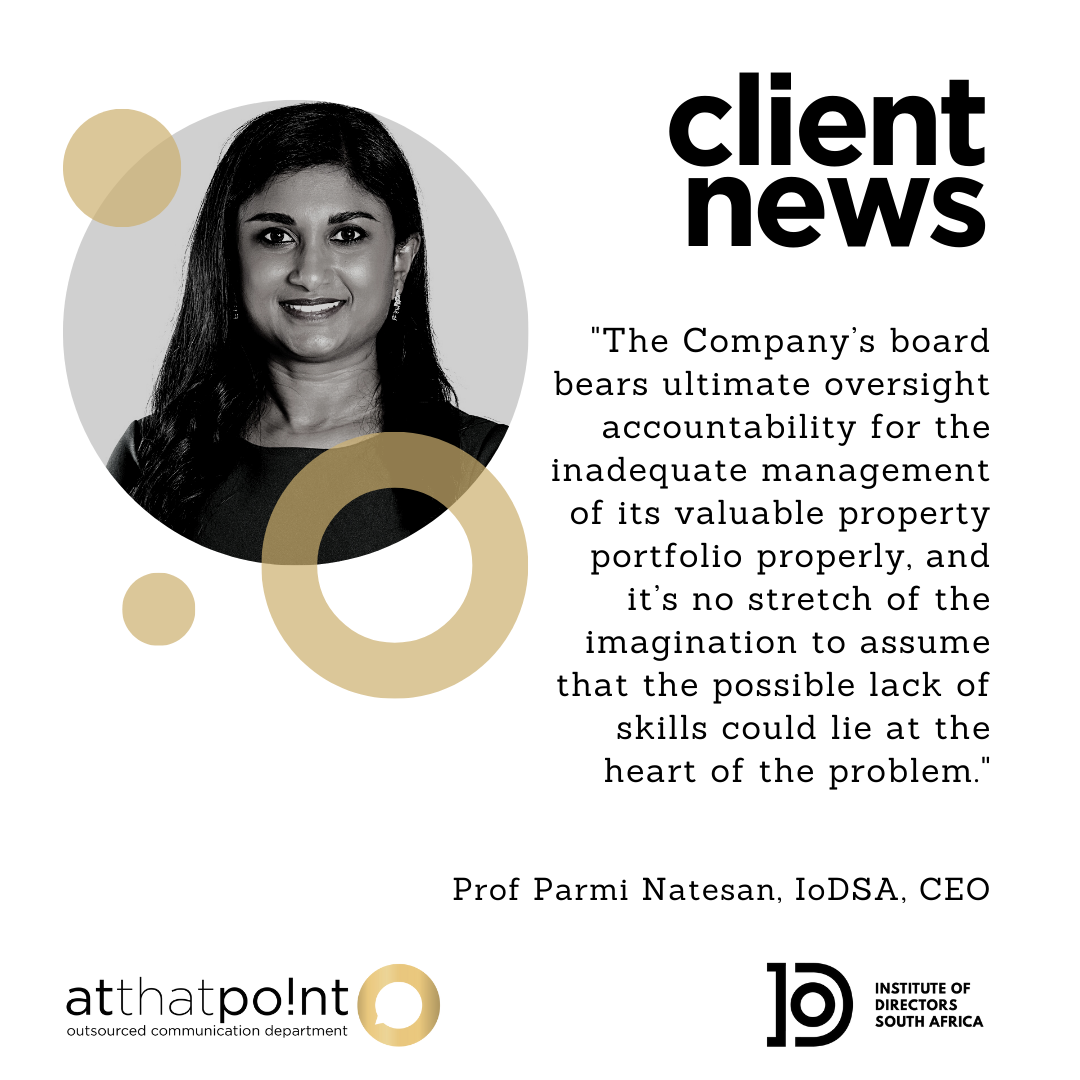 A slew of recent media reports indicate that the Johannesburg Property Company has appointed several individuals to its board who, on the face of it, do not possess the necessary skills to govern a significant municipal entity with a property portfolio worth an estimated R8.7 billion. These appointments, which are reported to include a receptionist, a cashier and a person without matric, appear to have been made unilaterally by the MMC for Economic Development. “The Johannesburg Property Company manages 30 000 properties, many of which have reportedly been hijacked—in fact, the devastating Albert Street fire that claimed 77 lives was apparently one of them. The Company’s board bears ultimate oversight accountability for the inadequate management of its valuable property portfolio properly, and it’s no stretch of the imagination to assume that the possible lack of skills could lie at the heart of the problem,” says Professor Parmi Natesan, CEO of the Institute of Directors in South Africa (IoDSA). “Media reports also suggest that the MMC treats the company as a private fiefdom to which political cadres are appointed, based presumably on their loyalty and political importance, and not necessarily their skills as directors. The sad state of municipal entities across the city, and indeed the country, shows the devastating consequences of flouting robust nomination processes for board and senior executive positions.” The IoDSA has repeatedly pointed out that public sector entities face particular challenges when it comes to appointing competent boards. The state, as the sole shareholder, has not been seen to follow best practice in this regard. According to King IV, directors should have the correct mix of skills and experience to discharge their legal duties. A robust and transparent nomination process that includes in-depth vetting of candidates should be followed, says Professor Natesan. “Without such a nomination process, the board members can hardly act competently and independently in order to fulfil their legal duties, which are to the company and not to whoever appointed them,” Professor Natesan says. “I wonder if these directors realise that they can be held personally liable for any untoward decisions they make. Modern-day directors need not only business and sector skills and experience, but also finely honed governance expertise.” The performance of local government generally, including municipal entities like the Johannesburg Property Company, has a direct bearing on service delivery and thus on the most vulnerable sectors of society. The Auditor-General’s Consolidated General Report on Local Government Audit Outcomes 2021-22, an annual report on audit outcomes for entities governed by the Municipal Finance Management Act, notes that fruitless and wasteful expenditure continues to balloon. It doubled in 2021-22 to R4.74 billion, plus an estimated R5.19 billion in financial loss from non-compliance and fraud. It is clearly imperative that municipalities and municipal entities are properly governed, and the Auditor-General highlights the need for competent people to be appointed to municipal structures, and for governance to be strengthened. “The Johannesburg Property Company is just one of many municipal entities that are perceived to be – and often are – underperforming, with one of the reasons for that underperformance reasonably assumed to be that board appointments are not necessarily made with the entity’s needs in mind,” she argues. “These entities need proper governance and strong oversight or they are likely to fail to do their jobs, with disastrous consequences for society and our country.” ENDS MEDIA CONTACT: Idéle Prinsloo, [email protected], 082 573 9219, www.atthatpoint.co.za For more information on the IoDSA please visit: Website: www.iodsa.co.za Twitter: @The_IoDSA LinkedIn: Institute of Directors in South Africa Company Page Facebook: Institute of Directors South Africa News reports that the Minister of Public Enterprises has rejected the name put forward by the Eskom board to replace André de Ruyter as CEO once again raising the complex governance issues relating to the appointment of senior management at state-owned enterprises (SOEs). The reported reason for the Minister’s rejection of the board’s nominated candidate is that it was supposed to submit three names as stipulated by the Minister in terms of Eskom’s Memorandum of Incorporation.
Professor Parmi Natesan, CEO of the Institute of Directors in South Africa (IoDSA), says that the Minister’s rejection of the board’s nomination, whatever the technicalities, lays bare the governance tangle that continues to affect the governance balance at SOEs. “Governance best practice is for the board to appoint the CEO so that he or she is accountable to the board. The challenge is that SOEs have enabling legislation or founding documents which often stipulate that the government (effectively the shareholder) has the power to appoint senior management, as well as the board,” she says. “King IV recognises this, and suggests in the SOE supplement that the board be fully involved in the appointment of the CEO and that both parties agree that the CEO is accountable to the board, not the Minister, as representative of the shareholder.” If this approach is not followed, she adds, CEOs who do not have the confidence of the board may be appointed, and CEOs may see their reporting line leading directly to the Minister rather than the board. The resulting blurred reporting lines make it difficult for boards and management to work constructively together. The current state of affairs means that the faith of both the board and the Minister seems questionable. The former could be construed to be not following the Minister’s instructions, or rebellious in that it is asserting its preference for appointing the CEO it wants (in line with governance best practice). Similarly, the latter could be accused of having a hidden agenda, namely that the nomination did not meet with the approval of the political powers. Professor Natesan says. “The IoDSA has been steadfast in bringing this particular governance issue to the fore, and we once again urge Government and SOEs to follow King IV’s lead. In a perfect world, though, the appointment of the CEO should be the board’s prerogative. The board would then be able to hold the CEO properly to account, and could in turn itself be held to account by the shareholder.” ENDS MEDIA CONTACT: Stephné du Toit, [email protected], 084 587 9933, www.atthatpoint.co.za For more information on the IoDSA please visit: Website: www.iodsa.co.za Twitter: @The_IoDSA LinkedIn: Facebook: Institute of Directors South Africa IoDSA and King Committee welcome proposed amendments relating to social and ethics committees12/9/2023 The Institute of Directors in South Africa (IoDSA) and the King Committee have broadly welcomed the amendments relating to social and ethics committees (SECs) in the Companies Amendment Bills.
Prof Parmi Natesan, CEO of the IoDSA, expressed support of the new clause (6A) proposed for section 72, which allows the minister to prescribe the minimum qualifications, skills and requirements for the SEC. “The IoDSA has consistently advocated for all board members to have the necessary knowledge, skills and experience to discharge their duties adequately,” she says. “Our Director Competency Framework will assist directors to acquire the skills they need on the board and the SEC.” The Chair of the King Committee, Ansie Ramalho, highlights three significant changes. One is the requirement for public companies and state-owned enterprises to appoint SEC members at their AGMs. The second proposed change requires the representation of non-executive directors on the SEC and the other involves the tabling of an SEC report at the AGM. Ramalho agrees with giving SECs more prominence. ”The requirements introduced by the Bill for the election and qualifications of members of SECs are likely to elevate its authority and effectiveness which is critical for a committee which exercises oversight of matters as important as the social and environmental impact of companies’ output and operations.” Ramalho suggests, however, that there be a rewrite of the regulations that address the responsibilities of the committee. “Currently the regulations do not deal with oversight of company ethics as an area for oversight by the SEC, despite - judging by the given name of the committee - it clearly being the intention. Also, other areas for monitoring and oversight as stated in the regulations are not sufficiently focused for meaningful reporting against which the SEC could be held accountable,” she says. Deon Rossouw, a member of the King Committee and Chair of the IoDSAs Social and Ethics Committee Forum, says that the intention to exempt certain companies, such as subsidiaries of a company that has an SEC, will contribute to the ease of doing business and eliminate duplicate administration. Rossouw also lauds the inclusion of a clause requiring an SEC report to be tabled at the AGM. “In line with modern thinking, it is important that shareholders are informed not only about the company’s financial performance but also about how it does business and its impact on society,” he says. However, he sounds a note of caution: while the new Bill requires the SEC report to be made “in the prescribed manner and form”, it does not provide guidance as to either. “We were very thankful that the drafters dropped the requirement for the SEC report to be passed by a resolution at the AGM as was previously tabled in the 2021 bill, which we argued was a bad idea since the report would contain historic information, thus a fait accompli which the vote cannot change,” he says. ENDS MEDIA CONTACT: Stephné du Toit, [email protected], 084 587 9933, www.atthatpoint.co.za For more information on the IoDSA please visit: Website: www.iodsa.co.za Twitter: @The_IoDSA LinkedIn: Institute of Directors South Africa Company Page Facebook: Institute of Directors South Africa The Institute of Directors in South Africa (IoDSA) and the King Committee say that, although they remain supportive of reform efforts in what is a highly contested area, some of the proposals contained in the Companies Act Amendment Bills 2023 relating to remuneration are problematic.
Both bodies agree that the proposal to have the remuneration policy tabled for approval at the AGM only every three years or when material amendments are made is constructive in that it gives shareholders a real voice. It is also in line with international leading practice. However, they are ringing alarm bells over proposals relating to firstly the voting on the remuneration implementation report and secondly, the consequences of the report not being approved at the AGM. The issue here is that in terms of the proposed Bill, the Remuneration Committee (RemCo) has to present its implementation report (giving effect to the remuneration policy) for approval at every AGM. If the ordinary resolution on the implementation report is not passed by at least 50% of the votes in favour of the report, RemCo members are obliged to step down from the committee, for a period of at least three years, although they would be able to remain on as board directors. Professor Parmi Natesan, CEO of the IoDSA, says that the consequences of this would be undesirable and impractical on many levels. “It would mean that those board members with specialist remuneration skills (already in short supply) would be no longer available to serve on RemCo—this at a time when boards are under pressure to reduce in size. The former RemCo members could suffer considerable reputational damage anyway,” she says. “One could also foresee that shareholders could hold boards hostage by threatening to vote down the implementation report if their demands are not met.” Ansie Ramalho, Chair of the King Committee, argues that a vote on the implementation report is neither constructive nor instructive. “The intention behind King IV in providing for a non-binding advisory vote on remuneration implementation was to furnish the opportunity for engagement between the board and shareholders as a constructive avenue for airing views and resolving differences. A binding vote makes sense for the remuneration policy because it is forward-looking, but it does not make sense when it comes to the implementation report, which is why no other jurisdiction in the world has implemented it. The implementation report is like the financial statements: it presents historical information and similarly should simply be presented to the AGM, but not voted on.” “We have no objection against consequences, but they are in the hands of shareholders who have the right to vote against the appointment of directors involved in remuneration decisions. We should also not lose sight of the fact that the numbers in the remuneration report are an outcome of the implementation of a policy supposedly previously approved by shareholders.” Dr Ronel Nienaber, Chair of the IoDSA Remuneration Committee Forum, adds that there are important details that need to be carefully considered if this amendment is passed. For example, if the RemCo’s implementation report is not passed, would the members have to step down immediately? This would potentially mean that the new members of the RemCo would find themselves having to engage with the shareholders to understand their concerns without any insight into the rationale for the previous RemCo’s decisions. Nienaber also asks whether there would be any other consequences beyond the RemCo members having to stand down, such as an additional action calling for a clawback of monies already paid. Dr Mark Bussin, member of the King Committee and the IoDSA Remuneration Committee Forum, raises the issue of South Africa’s attractiveness as a place to do business, already being compromised. “If we become the first country to introduce a binding vote on the RemCo’s implementation report, we risk being seen to be unfriendly to business and not consistent with well-established principles,” he says. ENDS MEDIA CONTACT: Stephné du Toit, [email protected], 084 587 9933, www.atthatpoint.co.za For more information on the IoDSA please visit: Website: www.iodsa.co.za Twitter: @The_IoDSA LinkedIn: Institute of Directors South Africa Company Page Facebook: Institute of Directors South Africa |
Archives
July 2024
Categories
All
|




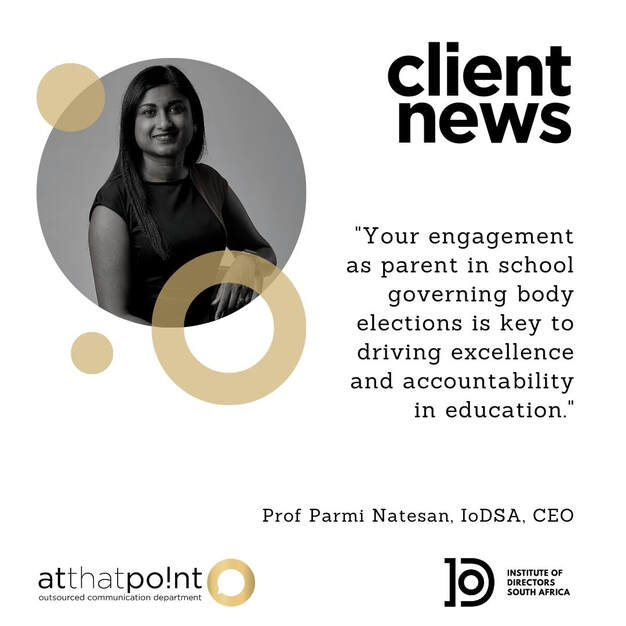
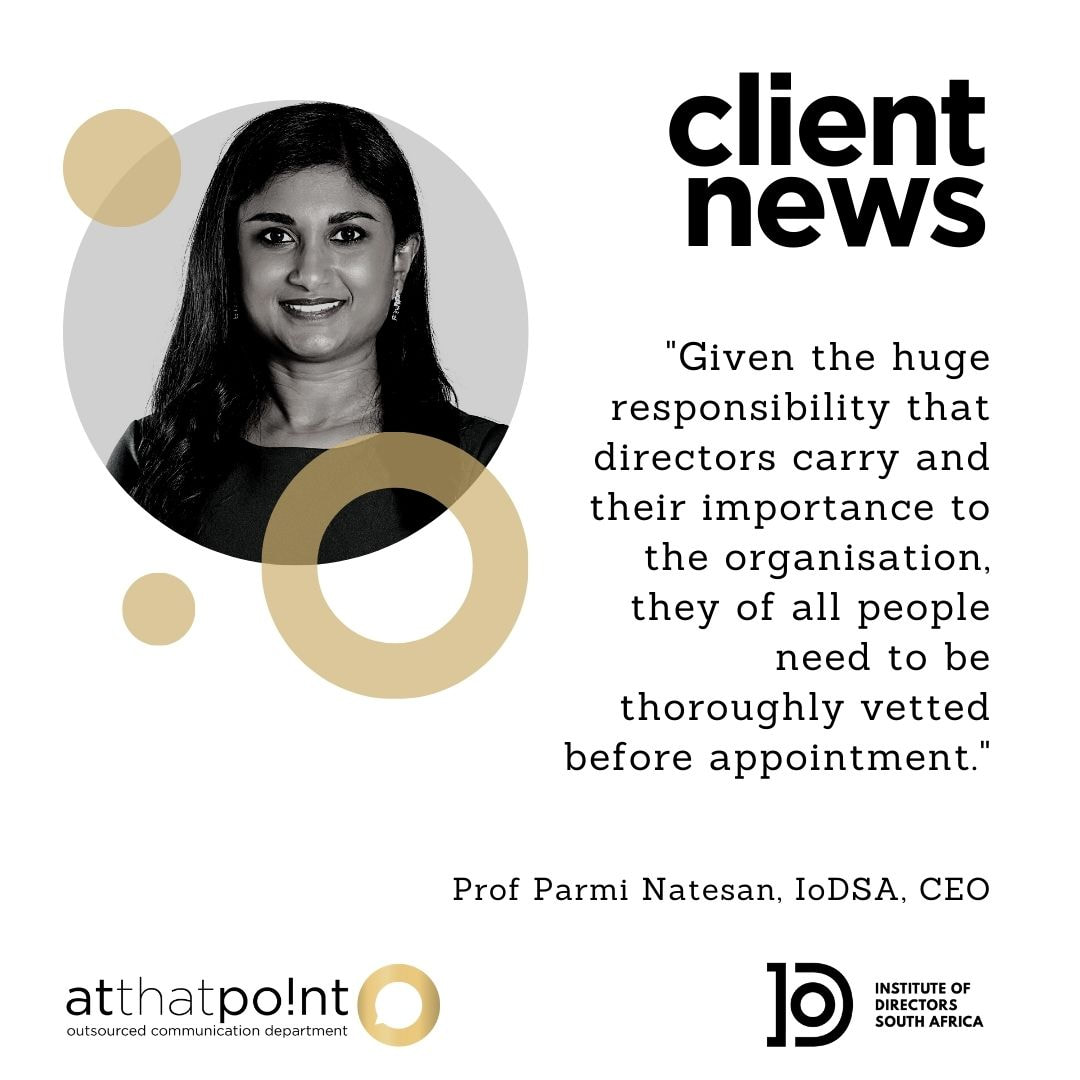
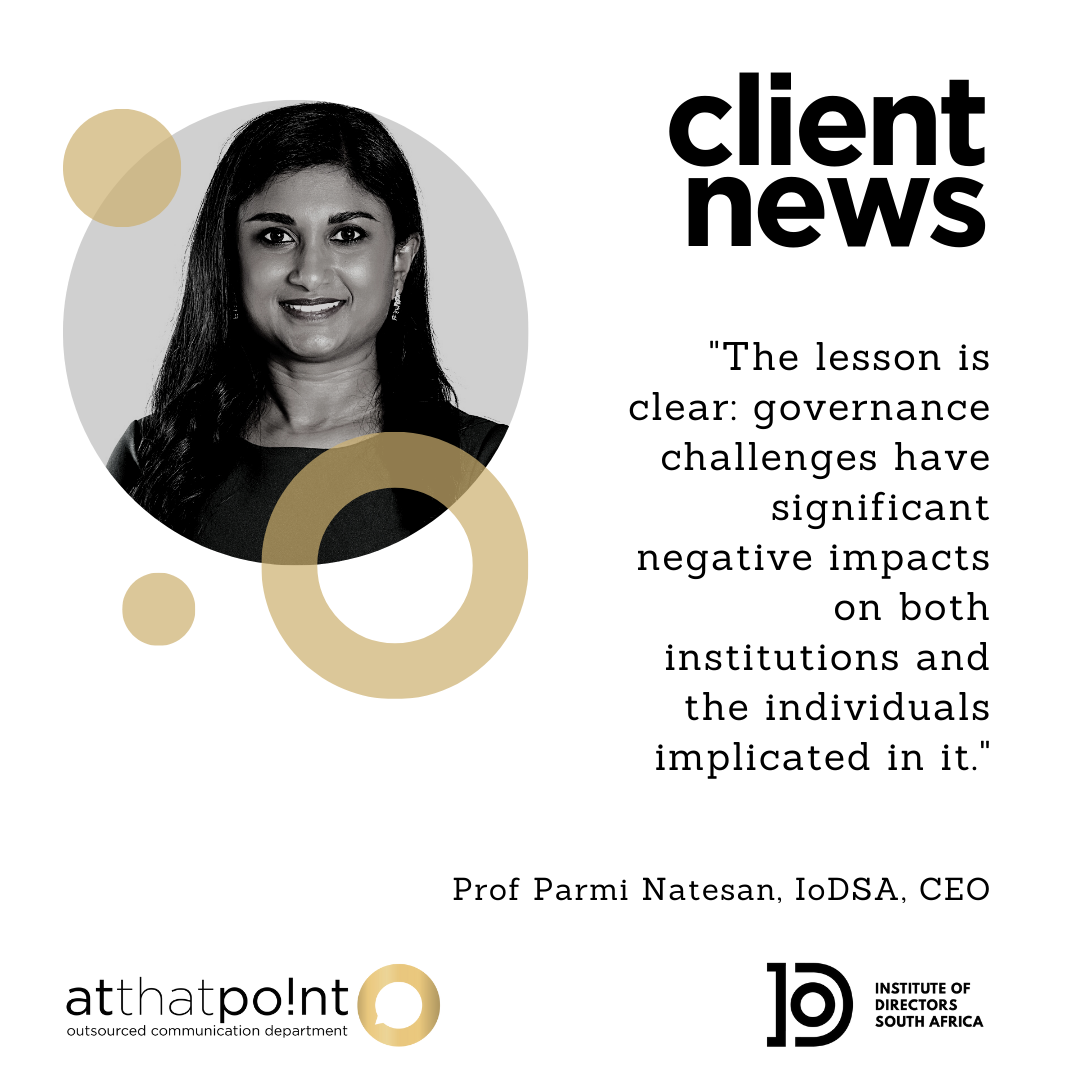
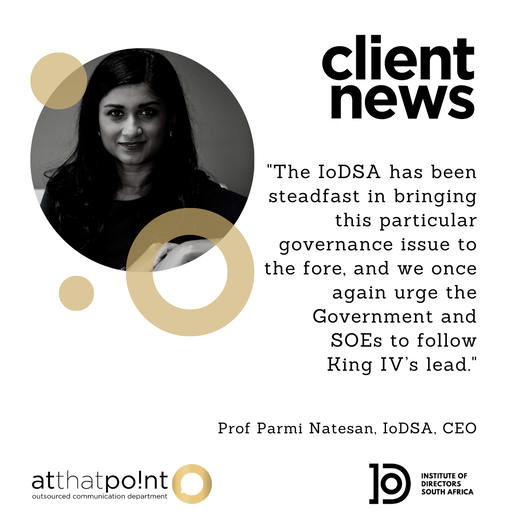
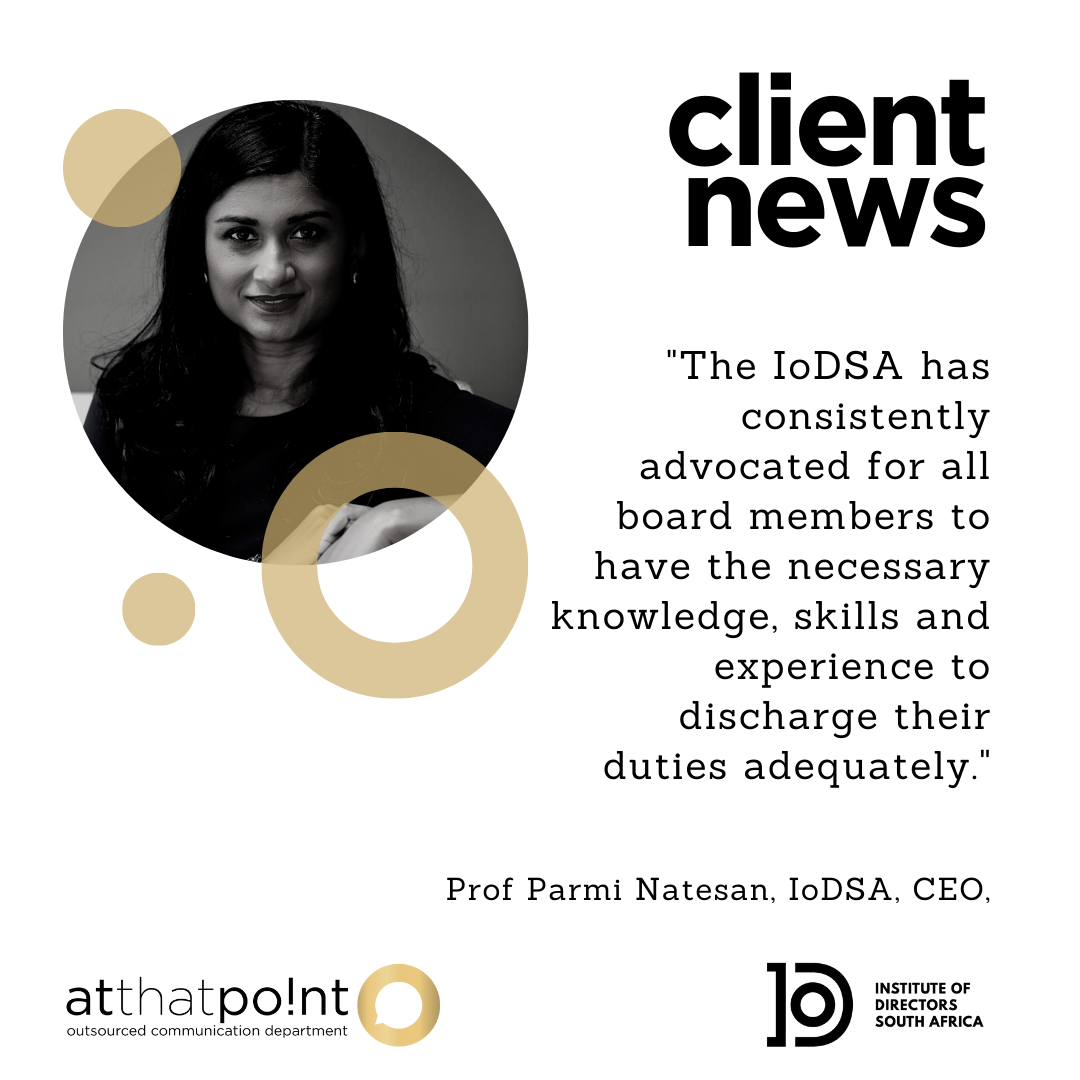
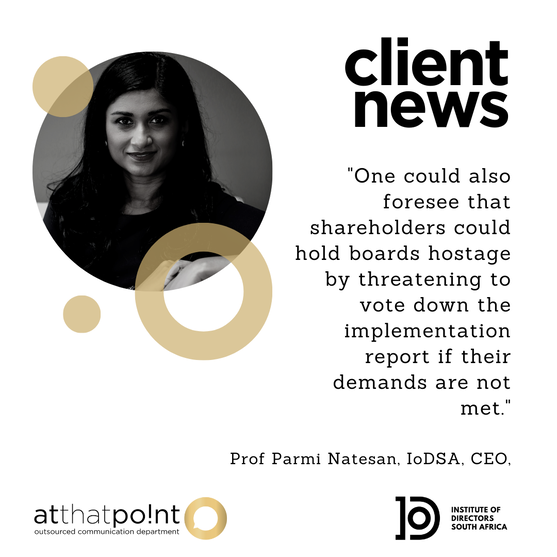
 RSS Feed
RSS Feed